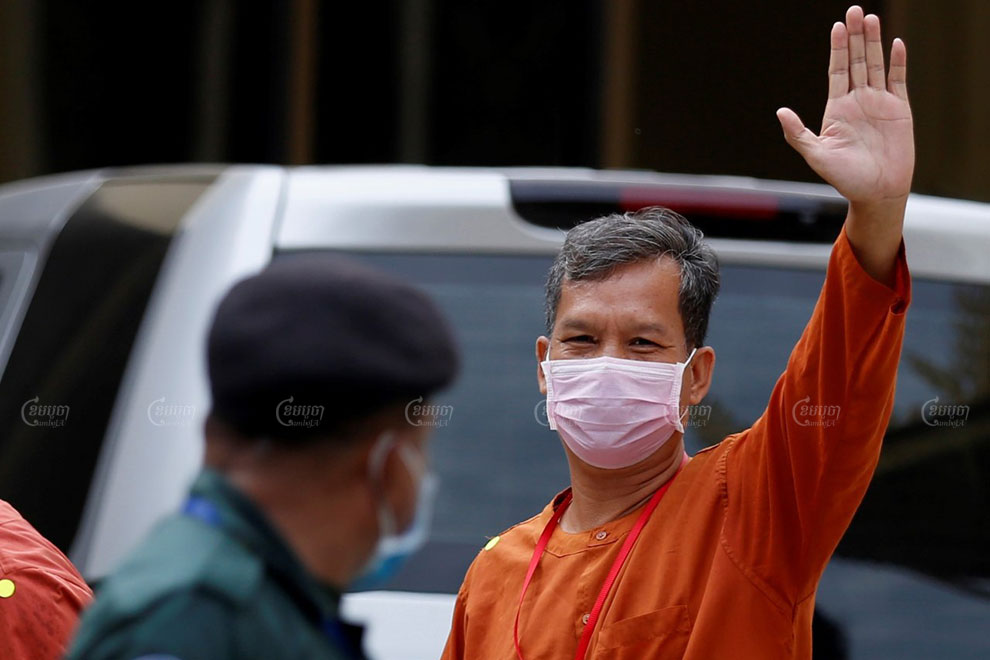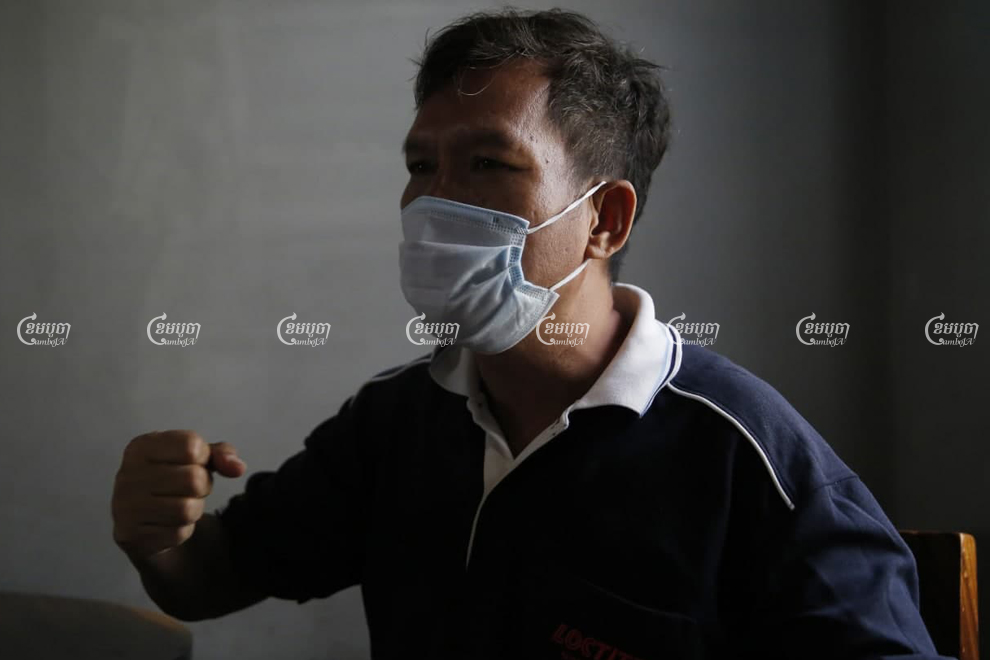Rath Rott Mony sits at a Phnom Penh café over the weekend, dressed in a blue shirt and grey trousers – gone are the orange prison overalls. The media fixer and translator was released from prison on Friday.
The 49-year-old man was arrested and convicted by a Phnom Penh court last year for helping produce a documentary for Russia’s RT news service on sex trafficking in Cambodia. He was charged with incitement and sentenced to two years in prison.
He is pleased to have left prison but is still concerned about being targeted if he continues with his previous line of work.
“I regret that I was imprisoned for two years because I was a fixer,” said Rott Mony. “I am concerned about my safety because my safety is unsure while the court does not hold a retrial yet,” Rott Mony.
This year the Supreme Court directed a retrial in his case, disagreeing with an Appeal Court ruling that the municipal court’s conviction was legally sound. Even as Rott Mony was released, he is still awaiting a retrial in the case – he can only get a lesser prison sentence after the retrial because the conviction was appealed by the defendant and not the prosecution.
Reentry into Cambodian society brings Rott Mony face-to-face with another test for the family. After the government expressed its anger at the RT documentary, the media fixer fled to Thailand seeking asylum, but was deported in December 2018 by Thai authorities.
Shortly after Rott Mony’s conviction, his wife Long Kimheang also left for Thailand with their child and has been in hiding since.
“It makes me very concerned about my wife and my son,” Rott Mony said. “I miss my wife and my son because I haven’t seen them for a long time.”
He said that his wife wants to come back to Cambodia – she has not been publicly charged of any crimes – but he does not know whether local authorities will allow her to return. He is worried Cambodian authorities would not be happy Kimheang petitioned for his release and protested on multiple occasions outside the Russian Embassy in Phnom Penh from late 2018 to early 2019.
Rott Mony said his wife was under surveillance by Thai authorities and had rarely left the room she was staying in.

Ny Sokha, the head of monitoring for local rights group ADHOC, said the courts were moving very slow in processing Rott Mony’s case, given that he had already served his term before he could contest his conviction.
“It is a regret that the court’s procedures are progressing slowly which has made the defendant to lose his rights,” Sokha said, questioning if the Appeal Court will give Rott Mony any compensation if it was found out he was not guilty of the charges.
He said the court should enforce corrective measures to ensure that defendants don’t finish their sentences before they can complete the entire judicial and appeals process.
Sokha said Rott Mony’s conviction was a blow to press freedoms in Cambodia, revealing that journalists and fixers could get into legal trouble for doing their work.
“I think that it affects the journalists’ spirit,” said Sokha.
Touch Tharith, the spokesperson at the Appeal Court, could not be reached for comment.
Chin Malin, a Justice Ministry spokesperson, did not agree with Rott Mony’s accusations of a wrongful conviction or delays in the process. He said the court always followed the procedures written in law and based judgments on evidence, pointing out that Rott Mony’s release from prison on completion of his prison sentence was also an application of judicial procedures.
“The court processes the procedures normally and when he completed his jail term, he was let out,” said Malin.
Nop Vy, executive director at Cambodian Journalists Alliance, said the conviction was unjust for Rott Mony because he was just a fixer and was only assisting foreign journalists on the project.
He said it would have an effect on other fixers who would be reluctant to work with journalists.
“The court should drop all charges on him because it will make fixers and journalists afraid of doing their work,” said Vy.
The Cambodian government never said anything publicly about RT nor is there any suggestion that the issue was taken up with the Russian Embassy in Phnom Penh. The documentary remains online and can be viewed by anyone.
The state-owned publication even sent a letter to the Cambodian Embassy in Moscow clarifying that Rott Mony was only a “fixer and translator” for the documentary crew and had obtained consent forms from the women featured in the video. The two main characters in the documentary denied claims made in the video and said they were paid to speak on camera.
The Cambodian government has been particularly sensitive to stories about sex trafficking in the country. In 2017, it threatened to shut down anti-trafficking NGO Agape International Missions for allegedly misidentifying three girls sold into sexual slavery as Cambodians, when they were ethnic Vietnamese.
Similar to the RT documentary, international broadcaster CNN had featured the three girls’ stories in the “CNN Freedom Project,” an international news campaign by the U.S.-based television channel to end modern-day slavery.
Government officials, all the way up to Prime Minister Hun Sen, attacked CNN for its coverage of the story; anger that RT, formerly known as Russia Today, was spared in 2018.
Back at the café, Rott Mony is not shy to speak about his time in prison. He said he was first placed in a crowded cell block with people convicted for various crimes, but was later moved to one which housed more jailed human rights defenders and prisoners of “conscience.”
He said he would have to spend at least $175 to $200 a month to buy edible food and other items he needed while in prison. Rott Mony soon got the moniker “teacher” after he started helping a few inmates learn English.
“And while I taught English to some inmates, I also learned Thai and Vietnamese from other inmates and now I can speak Thai and Vietnamese,” he said.
Even though it’s been days since his release, Rott Mony is not necessarily shying away from returning to journalism. He said he had been granted a media license for an online publication he had founded called “Samleng Baksey.” While the publication was ready to publish news in 2018, Rott Mony’s arrest meant he never had a chance to use it.
“If I have ability, I want to be a journalist in the future,” said Rott Mony.








